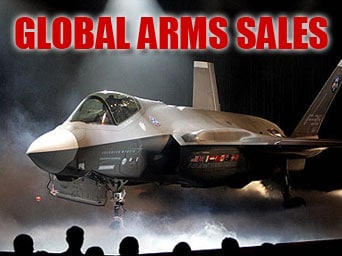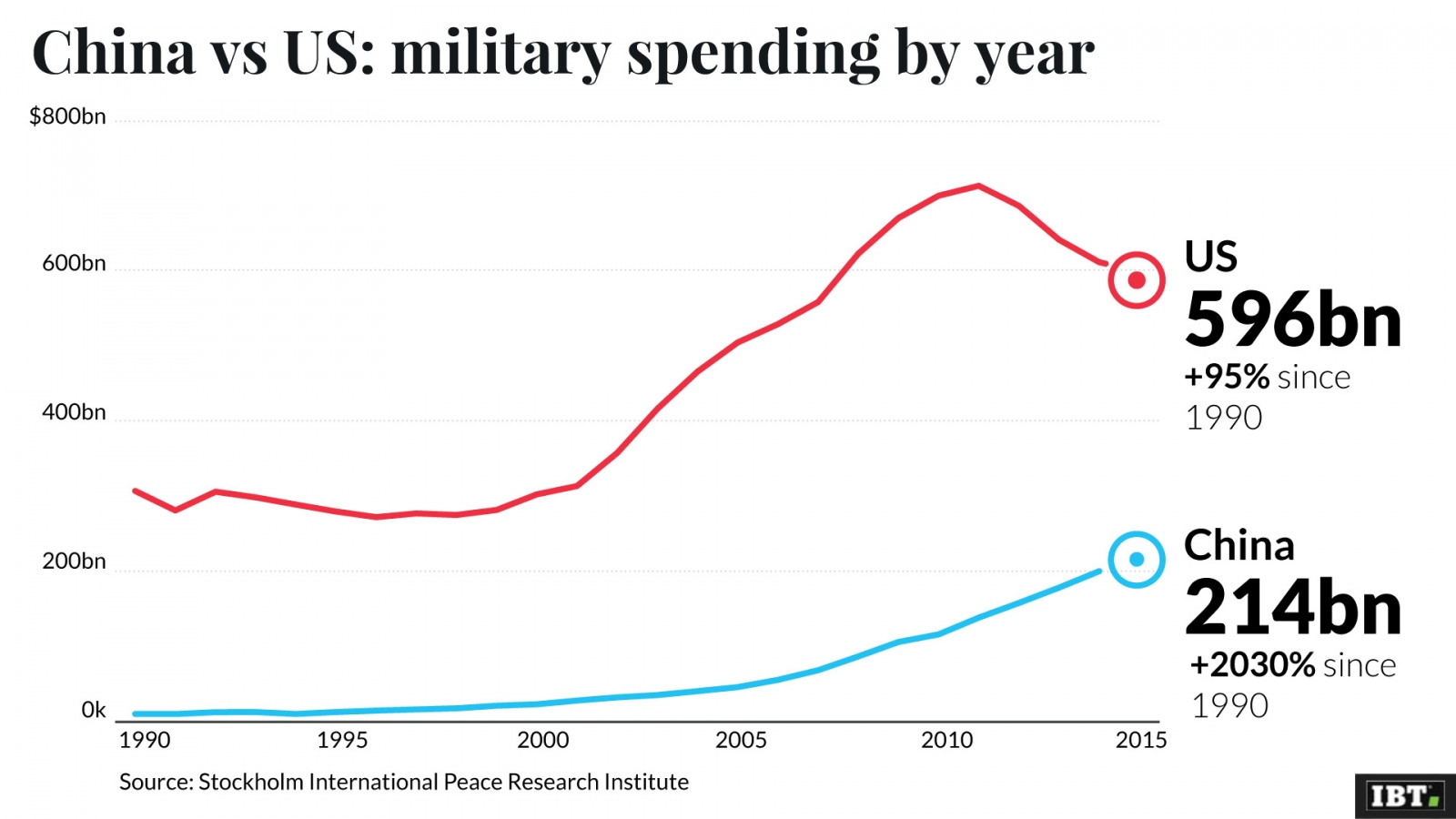
Why Does Washington Intend to Stir Up Asia Arms Race?
Song Zhongping / The Global Times
(July 21, 2021) — A Reuters article on Tuesday claimed that “Asia is sliding into a dangerous arms race as smaller nations that once stayed on the sidelines build arsenals of advanced long-range missiles.” It said that it is “driven by security concerns over China and a desire to reduce their reliance on the US.”
Western countries, especially the US, have repeatedly hyped up the “China threat” for a long time. Washington has been urging Asian countries, particularly its allies and partners, to reinforce their military strength and strengthen long-range strike capabilities. The latter can be achieved by either developing or purchasing missiles. Yet only a few of these countries have the ability to develop missiles by themselves. Most countries will have to turn to the US to purchase missiles.
The US’ purpose is clear: As the world’s leading arms dealer, Washington intends to create more panic among Asian countries by sensationalizing the “China threat” theory, making them feel that their security is threatened by China. This will encourage them to buy more weapons and equipment, including missiles, from Washington.
As a matter of fact, Asian countries’ “security concerns over China” is a notion that is completely hyped by the US. China has no intention to threaten any country. China has always adhered to the principle of being a friendly neighbor and pursued peaceful development.
The US would like to see an arms race in Asia. If China’s neighboring countries start an arms race, Beijing will be forced to participate in it. This will drag down China’s economic development. On the other hand, the US will benefit from it: Apart from heavily profiting from arms sales, Washington can realize its intention of relying on allies and partners to counter Beijing. Since Biden took office, his administration has ratcheted up efforts in rallying allies against China on many occasions.
If there is really an arms race in Asia, Washington should assume the major responsibility.

Beijing should expose the US calculations to the international community, helping US’ Asian allies fully understand the US’ ultimate purpose and that an arms race will impair their own strength. Washington has labeled Beijing as a strategic competitor, sparing no efforts to counter China’s development.
By inciting the “China threat” theory and piling pressure on its allies to invest in defense capabilities, Washington intends to stir up an arms race in the region. In this context, Washington can keep itself out of the matter but manipulate its allies as puppets to achieve its goal of containing China with little cost.
The US allies in the Asia-Pacific region may not be naive about the Washington’s ultimate intent. But given Washington’s constant imposition of coercion and deterrence, these countries have to follow the US’ lead on some occasions.
Apart from exposing the US’ evil intention, China should ensure the international community, including the US’ allies, that we are a peace-loving country. China is developing its military strength only to safeguard its national security. China neither wants to engage in an arms race with any country, nor seek regional or global hegemony.
By contrast, Washington wants to see China and US allies and partners engage in an arms race — it knows this will damage both Beijing and other Asian countries. But fortunately, US allies and partners will not be easily fooled.
Although Washington sees China as its top competitor, its allies and partners do not regard China in the same way. The current age is different from the Cold War era in which the world was divided into two blocs. Washington’s conspiracy to create further friction between China and other countries, in a bid to help itself better contain China, will not succeed.
The author is a Chinese military expert and commentator.
It’s Delusional to Incite Arms Races in US, Taiwan

Global Times Editorial
(March 7, 2021) — Around the same time when China announced on Friday a projected 6.8-percent increase in military spending, eight Republicans on the US House Armed Services Committee pressed US President Joe Biden to increase US defense budget by 3 to 5 percent. The eight lawmakers wrote in the letter to Biden, “If we do not make the investments our military needs today, we will not be able to defend our nation or our allies in the future.”
Meanwhile, some in the island of Taiwan again called for an increase in the island’s military expenses. They claimed that Israel has maintained a military budget of about 5 percent of its GDP but the island’s military budget has never been more than 3 percent of its GDP.
Such claims in the US and the island of Taiwan are tantamount to publicly inciting an arms race. Last year, the US’ military spending was four times that of China and about 3.4 percent of US GDP. The island of Taiwan’s military budget was 2.4 percent of its GDP.
Both numbers are much bigger than that of the Chinese mainland — which was less than 2 percent of GDP in 2020. Their call for an increase in military spending is completely driven by their abnormal view of security, and is even out of an intent to meet their domestic political needs, which has nothing to do with China’s defense budget increase.
China has gradually stabilized its annual increase in military spending, beginning to generally link the increase with its GDP growth. China has never taken aim at US military spending, nor does China want to engage in any form of arms race with the US. Our military budget is projected based on the need to safeguard China’s security, and the budget conforms to China’s own abilities. Therefore, China does not encounter many difficulties when formulating its defense budget.

As China’s military spending-GDP rate is much lower than that of many main economies in the world, and as China is realizing a rapid and stable growth in GDP, China can achieve sustainable and stable rapid growth in military expenditure without having to take on more pressure.
The US has been pursuing absolute advantage in the military sphere. It already has the strongest military in the world, but it always feels that its advantage over other countries is not enough. With this mentality, no matter how much the country’s military expenditure is, it won’t feel enough. The US’ defense budget is too large to have any reference — it is no longer about the real need to address national security, but the greed of geopolitical maniacs in the US.
China has no ambition to become the world’s leading military power or seek overwhelming military superiority. China pursues a national defense strategy that is defensive in nature. What we want to build is a strong ability to stop the war, the ability to destroy invaders and inflict unbearable losses on attackers, and then the ability to make them fear of invading China.
To ensure that all forces are convinced that a strategic invasion of China is a costly form of suicide, it does not require an unlimited expansion of military power. There is always a vague line of “enough” in China’s military development.
If any country tries to engage in an arms race with a strategically conscious country like China, whose military spending is driven by economic development, the result will be more confusion for them. The more money they spend, the farther they are likely to stray from a reasonable route of defense.
The US already spends over 3 percent of its GDP on the military, far more than the average country in the world, and nearly three times as much as China. In this case, if the US still feels insecure, it can no longer feel safe. Its anxiety is already coming from the character of the country itself.
Military spending on the island of Taiwan is now less than a 10th of that of the Chinese mainland, and the annual increase in mainland’s military spending is equivalent to the island’s total annual military expenditure. But the logic of some activists in Taiwan, who argue that increased military spending will keep Taiwan secure, seems particularly silly.
If the US is going to significantly increase its military spending, let them do so. In no way will they increase returns for the US. Even if the US peddles its super military strength around the world as the biggest label of its hegemony, increasing military spending on top of its $700 billion expenditure is an addictive spending quirk. The “protection fees” it collects from the world through various means are already high, and it needs to understand the balance between military expansion and economic development.
The US is fully aware that the island of Taiwan cannot be mentioned in the same breath as Israel. The insecurity of the island is suffering from the DPP authorities’ own actions. It’s delusional for them try to create certain kind of security. Political rationality is the real safety belt for Taiwan.
Without it, its increased military spending is likely to run counter to its goal of greater security. The amount of military spending they increase cannot support the Taiwan independence ambition at all. Stay awake, do not build castles in the air, and Taiwan will be safe without increasing its military spending.
Posted in accordance with Title 17, Section 107, US Code, for noncommercial, educational purposes.